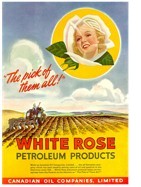

The new company’s main asset was it’s 10,000 barrel a day refinery at Petrolia that produced mainly kerosene. Steps were taken to increase production of the fairly new but rapidly growing product - gasoline. New equipment was installed, retail outlets and a sales force were organized and products were sold as far afield as Halifax. By 1913, the company had branches from coast to coast, and sales of $2,500,000 a year. At the end of the Great War, sales boomed and the company expanded rapidly.
In the early thirties, the parent company - National Refining - began to decline and in 1938 sold the company to Nesbitt, Thomson & Co., of Montreal. In a then huge capital program of $1,500,000 the whole network was rejuvenated, new outlets and bulk plants built and their refinery was modernized.
Nesbitt Thomson is the company that merged Frontenac Oil Refineries with McColl Bros. in 1927 to form McColl Frontenac. A competition was held for the design of a White Rose logo depicting the actual flower. The winner was Bill Templeton, an artist employed with the advertising firm of E.L. Ruddy of Toronto (well-known billboard sign company). Templeton had ties with members of the "Group of Seven". Group of Seven member A. J. Casson (famous Canadian artist) was the illustrator of several Imperial Oil illustrations in McLean’s magazine of the 1930’s.
The "Boy
and Slate" logo, in use since 1917, was phased out beginning in
1939, being replaced with the newly designed rose. The "Boy and Slate"
was probably the best known logo of its day.
In the early sixties, the story of "White Rose" drew to a close,
being bought out by the expanding Shell Oil Company of Canada, and by the
mid-sixties the once familiar White Rose, faded from the highways of Canada
For a more detailed history see The White Rose Story link.